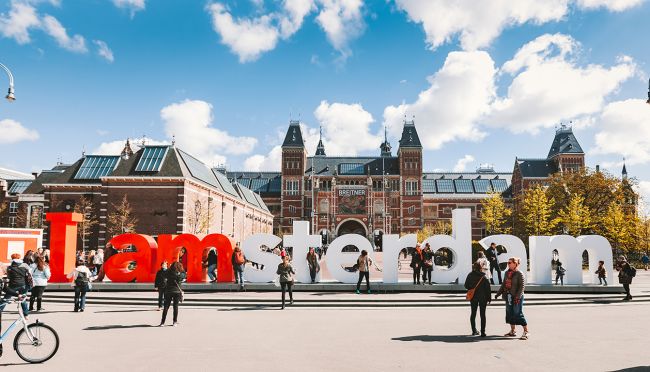Israel →
→

- 11 Mar 2019
- Research & Ideas
Branding Sells Cereal, Handbags, and Vacations. Can It Sell a Country?
Countries such as Israel now realize they need to engage in public diplomacy as well as foreign diplomacy, and in place branding, not just political advocacy, says Elie Ofek. Open for comment; 0 Comments.
- 13 Oct 2015
- Research & Ideas
Does Business Get Done the Same Way in Emerging and Developed Countries?
Leaders of two prominent business enterprises in Turkey, Rahmi M. Koç and Hamdi Akin, discuss the advantages and challenges of being entrepreneurs in an emerging economy with Professor Felix Oberholzer-Gee. Open for comment; 0 Comments.

- 15 May 2015
- Research & Ideas
Kids Benefit From Having a Working Mom
Women whose moms worked outside the home are more likely to have jobs themselves, are more likely to hold supervisory responsibility at those jobs, and earn higher wages than women whose mothers stayed home full time, according to research by Kathleen McGinn and colleagues. Open for comment; 0 Comments.
- 14 Jan 2015
- Research & Ideas
Thriving in the Turbulence of Emerging Markets
Entrepreneurs in developing market economies face special management challenges. Company leaders in India, Turkey, and Africa discuss their experiences with Harvard Business School's Creating Emerging Markets project. Open for comment; 0 Comments.

- 06 Jan 2015
- Working Paper Summaries
Henry A. Kissinger as Negotiator: Background and Key Accomplishments
This paper describes three of the most pivotal negotiations of statesman, scholar, and public intellectual Henry A. Kissinger, born in 1923 to a German Jewish family in Fuerth. These negotiations include the historic establishment of United States diplomatic relations with the People's Republic of China, the easing of geopolitical tension with the Soviet Union, and the mediation of the agreement on Sinai disengagement between Egypt and Israel. Additionally, the authors of this paper provide a brief summary of Kissinger's biography and career as well as an appendix of his involvement in other important diplomatic negotiations. In a forthcoming paper, the authors will examine these and other major events in which Henry Kissinger played leading roles in order to extract their most important insights into the principles and practice of effective negotiation. Key concepts include: Henry Kissinger played key roles in many important diplomatic negotiations. This paper outlines three in depth. Throughout his time as National Security Advisor and Secretary of State, Kissinger exerted a strong influence on American foreign policy. In tandem with working for détente with the Soviet Union, he played a central role in helping to end 23 years of diplomatic isolation and mutual suspicion between the United States and China as well as, after the 1973 Yom Kippur war, to orchestrate disengagement agreements between Egypt and Israel as well as Syria and Israel. Closed for comment; 0 Comments.
- 28 May 2014
- Research & Ideas
Building Histories of Emerging Economies One Interview at a Time
Much of modern business history has been written on experiences in the United States, Europe, and Japan. Now, the unheard stories of emerging markets in Africa, Asia, and Latin America are being told on a new website by the Business History Initiative. Open for comment; 0 Comments.
- 04 Dec 2013
- Research & Ideas
The Fantastic Horizon: How to Invest in a New City
Rapid urbanization and resource scarcity pose problems—and opportunities—for businesses and governments all over the world. Senior Lecturer John Macomber writes about his recent investigative visits to nascent privately-funded municipalities in Saudi Arabia and Vietnam. Closed for comment; 0 Comments.
- 26 Jun 2013
- Op-Ed
A Roadmap for Afghanistan’s Economic Future
Most discussions about the immediate future of Afghanistan center on security. A consideration just as important, says Professor Tarun Khanna, is rebuilding the embattled country's economy. Closed for comment; 0 Comments.
- 19 Dec 2012
- Research & Ideas
Affordable Housing: Israel and the United States
At a recent conference in Herzliya, Israel, Nicolas P. Retsinas, John H. Vogel, and Charles S. Laven joined residential developers, non-profits, national and local government officials, and academics to brainstorm approaches to affordable rental housing. Open for comment; 0 Comments.
- 03 Mar 2011
- Research & Ideas
HBS Faculty on Revolution in the Middle East and North Africa
The historic events in North Africa and the Middle East are examined by three professors: Deepak Malhotra, an authority on negotiation strategy; Noel Maurer, an expert on the politics and economics of the energy business; and Magnus Thor Torfason, an authority on how behavior is influenced by the social structures of individuals and organizations. Key concepts include: The US response to events in the Middle East and North Africa needs to be guided by three key tenets of effective diplomacy: considering our enemies tomorrow, not just our friends today; identifying what makes these situations different from other, similar situations; and being steered by values that can be clearly and consistently articulated. Although they bring uncertainty and higher oil prices in the short term, these revolutions offer the possibility of enhanced representation that will bring the people in these nations more stability, public goods, and a better and more competitive business environment. In autocratic states, protestors always face the threat of violent retribution. Social media networks helped to allay fears by showing people beforehand that the protests would be huge, thus providing some reassurance that it would be difficult for the regimes to retaliate. However, powerful international networks formed through major organizations, such as the United Nations, may be necessary to determine whether the protests are ultimately successful. Open for comment; 0 Comments.
- 10 Jul 2009
- Research Event
Business Summit: The Coming World Oil Crisis
Without enormous changes the world faces an imminent oil crisis—and there are no silver bullet solutions. People must wake up to the sobering ramifications of peak oil, which may be the defining issue of this century. Closed for comment; 0 Comments.

- 15 May 2007
- Working Paper Summaries
How is Foreign Aid Spent? Evidence from a Compelling Natural Experiment
Foreign aid is viewed as a transfer of resources that can be used to generate meaningful growth in the recipient country's economy. How this aid is ultimately spent, therefore, determines how effective it is in achieving its purposes. Yet economists to date possess little understanding of how foreign aid trickles through a country's economy. This paper examines a foreign aid windfall that poorer Muslim countries have systematically received from rich, oil-producing Arab states. When the price of oil skyrocketed during the 1973-1986 oil crisis (and again after 2001), OPEC nations took a substantial portion of the money they received and gave it away as foreign aid, mostly to Muslim nations. When the price of oil crashed and income plunged in the oil-producing countries, the aid dried up. Werker, Ahmed, and Cohen examined the short-term effect of foreign aid on aggregate demand, the components of gross domestic product, and the balance of payments. Key concepts include: Oil-driven bonuses in foreign aid from wealthy Arab oil producers to poor Muslim countries were mostly consumed on imported non-capital goods. The aid crowded out domestic savings and did little to attract foreign investment. Long-term economic growth was unaffected. The popular critique that aid is "wasted" did not jibe with the data. Every component of the domestic economy, including investment, was raised in the short term. Foreign aid may be an effective tool of fiscal policy that can be used to smooth the business cycle in developing countries. But a challenge remains: How can the temporary stimulus be converted into lasting economic growth? Closed for comment; 0 Comments.
- 19 Mar 2007
- Research & Ideas
Handicapping the Best Countries for Business
India? South Africa? Russia? Which are the best countries for a firm to invest in? In a new book, Professor Richard Vietor looks at the economic, political, and structural strengths and weaknesses of ten countries and tells readers how to analyze the development of these areas in the future. Read our Q&A and book excerpt. Key concepts include: Governments create the overall environment for successful competition in the global economy. Bad government can only lead to less competitive businesses. To be competitive, countries need to offer businesses sound fiscal and monetary policies, secure property rights, high savings and investment, an absence of corruption, and exports that are competitive in enough areas to eventually balance imports. Business people must understand where markets and countries are headed by analyzing the present and then extending current performance trends forward three to five years. Although each has issues, Singapore, China, and India are currently the best bets for FDI and, pending political stability, so is Russia. Closed for comment; 0 Comments.
- 27 Sep 2006
- Research & Ideas
Report From Egypt: Studying Global Influences
On a recent trip to Cairo, Rosabeth Moss Kanter studied three international companies to better understand the effects of globalization on them and the surrounding region. In this report, she looks at current business trends in Egypt, including the increasing privatization of state-run businesses. Key concepts include: Egypt is interested in attracting more foreign direct investment, and is studying what multinationals need and want. Leading global companies operating in Egypt actively teach and transmit business standards and techniques to their local customers, especially small businesses. Community service programs are another way multinationals influence the local business environment. One effort helps laid-off employees start small businesses that offer new services to villages. Closed for comment; 0 Comments.

- 08 Aug 2006
- Working Paper Summaries
Managing Governments: Unilever in India and Turkey, 1950–1980
During the postwar decades, consumer-products giant Unilever survived and even thrived in developing countries such as India and Turkey even as business conditions discouraged or drove away peer companies. Why? At least five factors explain Unilever's ability and willingness to persist in such developing countries. These factors may also explain why foreign direct investment shrank to low levels in these countries, and has remained low. Key concepts include: Most important of all, Unilever became embedded in local business and political systems, functioning as a quasi-insider. Unilever held first-mover advantage. Unilever took a long-term investment horizon, believing that sooner or later as incomes rose people would want to consume its products. A decentralized management structure gave Unilever flexibility in adjusting to the different environments of developing countries. Localization of management provided a key competitive advantage. Unilever's policy of staying outside party politics meant that it had few enemies. Closed for comment; 0 Comments.
- 04 Feb 2002
- Research & Ideas
How To Do Business in Islamic Countries
What's it like doing business in Islamic countries today? Harvard Business School professor Samuel L. Hayes III and Harvard Law School professor Frank E. Vogel recently gave students the real deal. Closed for comment; 0 Comments.
- 23 Apr 2001
- Research & Ideas
The Gulf: It’s a Family Affair
In a wide-ranging interview with HBS Working Knowledge, HBS professor John Davis discusses the state of family-business research—and the special challenges faced by families in the Gulf Region. Closed for comment; 0 Comments.

Israel Turns 70: Does it Need a Rebrand?
When market research revealed that many people associated Israel with military and political conflict, the country knew a rebrand was in order. In this podcast, Elie Ofek discusses the campaign's results. Open for comment; 0 Comments.